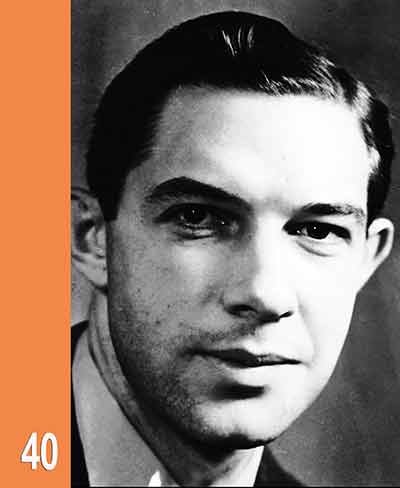John Hightower
Induction Year:¬Ý2001
Lived:¬Ý1909-1987
Papers:
Knoxville News-Sentinel; The Associated Press; Santa Fe New Mexican
Tennessean John Hightower capped a 34-year career at the Associated Press by winning a Pulitzer Prize and two other national awards before retiring to teach journalism in 1971. His career took him to some of the most distinguished assignments at AP.
During his first year at the University of Tennessee, the native of Coal Creek, Tennessee, (now Lake City) edited a campus magazine, but he had dreams of being a star reporter with a metropolitan newspaper. So after his sophomore year he moved to New York City to learn from experience. Hightower eventually landed a job as the associate editor of two monthly pharmaceutical trade publications, but the nagging desire to be a reporter remained. He left New York in 1931 hoping to get newspaper experience in Tennessee. He was hired by the Knoxville News-Sentinel in August as a fledgling reporter and worked there for two-and-a-half years, eventually becoming city editor.
Hightower next took a position as night editor at AP's Nashville bureau. He said in his 1933 letter of application that he wanted to work for "a news service so unbiased in its reports that it serves papers of every faith and creed with equal satisfaction."
By June of 1935 he was AP's first Tennessee state editor. He was in Nashville for three years before he requested a transfer to New York. Instead he ended up at AP's Washington, D.C. bureau. He was "general staff" in Washington, and it was during World War II that Hightower received great commendation for his six-part series on the development of radar. By war's end, he was the AP's diplomatic editor. He wrote the lead story on the atomic bombing of Japan.
The Associated Press held Hightower and his work in such high esteem, the organization nominated him for the 1944 Pulitzer Prize. But it was his second nomination in 1952 that won him the Pulitzer. He was honored for his accurate and insightful international reporting of diplomatic affairs. The Pulitzer committee particularly praised Hightower's prophetic coverage of the course of truce negotiations in the Korean War and of the events that led to President Truman's firing of General Douglas MacArthur, the Allied commander in Korea.
In addition to the Pulitzer, he was awarded two other top journalistic honors: the Raymond Clapper Memorial Award, from the American Society of Newspaper Editors, and the Sigma Delta Chi Award, an annual citation of the national journalism society. He was the first person to earn those three major awards in the same year. In 1964, he was named AP special correspondent. He retired from the organization after 34 years, taking a journalism teaching position at the University of New Mexico at Albuquerque and writing a column for the Santa Fe New Mexican.
He earned a Commander's Cross and a Chevalier of the French Legion of Honor and was named to the Order of Merit of the Federal Republic of Germany. In 1980 Hightower was named to the Hall of Fame of the Washington chapter of the Society of Professional Journalists. He is a member of the University of Tennessee's Academic Hall of Fame. He was named a Living Treasure in New Mexico in 1986, an honor given to those members of the community deemed role models who inspire with their hope, heart, and wisdom.
Hightower was married to Martha Joiner of New York City for 41 years. They had two sons and one daughter. He died in 1987.
